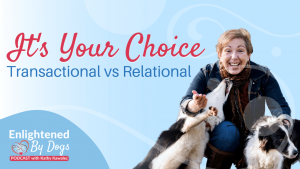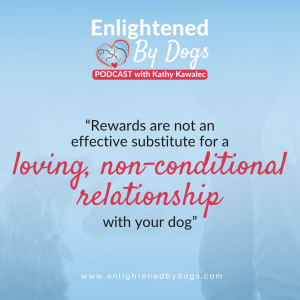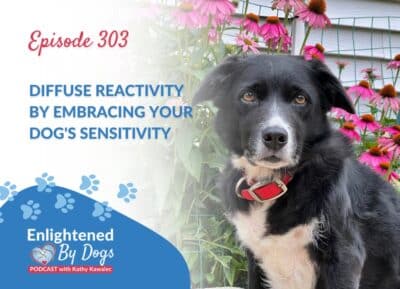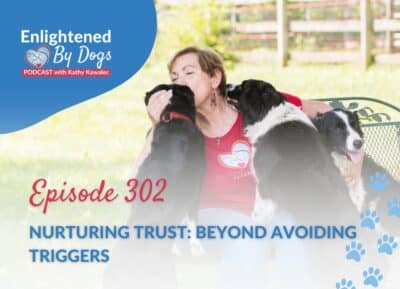Do you have a transactional or a relational lifestyle with your dog? And…is one better than the other?
If you’re scratching your head (and your dog is doing the same) – don’t worry, I’m going to explain all of this further as we go. But first, let me grab my white lab coat and talk a little about social intelligence. Like humans, dogs are socially intelligent beings. If we can learn how to tap into that intelligence, we can and should use it to form cooperative partnerships as a lifestyle with our dogs.
This is just one of the partnership principles that we live by inside my Brilliant Partners Academy. The clue is in the name – we strive to build a strong foundation with our dogs, grow the relationship, and become brilliant partners. Members discover the untold truth that we don’t need to focus on ‘fixing’ our dogs (because hey, they’re already perfect).
Instead, we need to focus on building trust, confidence, and a deep bond with our dogs. That’s the key to make sure our dogs feel safe, calm, and happy.
So, all of that sounds like a dream come true, right? I mean, who doesn’t want to create an enlightened partnership like this with their dog? But how can you build a trusting partnership with your dog without relying on rewards?
Let’s find out!
The problem with reward-based training
Are you tired of having to carry a pocket full of treats with you everywhere you go with your dog?
While there’s nothing wrong with giving your dog things like tasty treats and fun toys, they are not viable means to build a trusting partnership lifestyle with your dog.
Whenever I tell people this, I get one of two responses. Either the person will nod along in agreement and want to find out more about building a trusting partnership with their dog without depending on rewards. Or, they’ll fire out the usual dog training argument which goes a little something like this…
“Would you work for no pay? Of course not, so why should your dog?”
If I had a dollar for every time I heard that… I’d probably just get a lot more dogs…but anyways, here’s the problem with that mindset. Firstly, I didn’t bring my dogs into my life so I could boss them around. I don’t want my dogs to look at me like I’m their employer.
Secondly, my dog shouldn’t expect payment from our relationship. That’s what a transactional relationship basically is, it’s when your dog only does things for you because they want a reward.
The difference between transactional vs relational
As I said above, a transactional relationship with your dog is when your dog wants a reward for pretty much everything they do. That’s not to say there isn’t a time and place for treats and toys, that’s not what I’m saying.
I use positive dog training reinforcements when I train dogs or teach other dog moms to train their dogs. This involves rewarding our dogs for good behavior, tricks, sports, agility, and so on. A core part of dog training will always be transactional…and that’s okay!
But, what about the rest of the time?
What about when we’re hanging out at home with our dog and we aren’t training them?
Do you really want to form a solely transactional relationship with your dog?
Don’t you dream of having a loving bond with your faithful companion? One where you can both go on adventures together, cuddle on the sofa after a tiring day at work, and just be there for each other with no ‘payment’ needed?
While transactions have a place in dog training, your love for one another shouldn’t be solely based on transactions.
A relational relationship with your dog is where your dog feels safe, calm, and happy in your presence because they trust you. You’ve taken the time and put the effort in to form a lasting and unbreakable bond with your four-legged friend. You don’t have to rely on rewards to build an enjoyable lifestyle with your dog because you two are incredible partners. Your bond runs deeper than any meaty treat!
What does it mean to be a good leader?
You’ve probably heard a lot of dog trainers talk about how you have to be your dog’s leader. You need to “show them who’s the leader of the pack.” This type of dominance-based training is not something that I personally agree with because it instills a level of hostility. There’s an invisible hierarchy and you’ve placed yourself at the top, and your dog at the bottom.
This is definitely not the type of relationship I want to have with my dog. I want to build a partnership with my dogs, not a dictatorship.
Being a strong leader for your dog isn’t about domination. Relationships are built on trust. Without trust, the relationship will crumble.
Author, speaker, and expert on social leadership, Simon Sinek, did an incredible TED Talk, where he talked about the true meaning of leadership:
“Social animals have evolved to form circles of safety where members of the tribe, herd, and family feel safe and like they belong. The natural response to feeling safe amongst our own is trust and cooperation.”
Simon went on to say:
“The only variable that matters is inside the circle. That is where leadership matters. It’s the leader that sets the tone. When the leader makes the choice to put the safety of those inside the circle first, above all else so everyone inside the circle feels safe and like they belong, remarkable things happen.”
What dogs want more than anything is social engagement. They are social animals and want to be part of a pack – even if that pack is just you and your dog!
5 Things you need to know about your dog
We are culturally conditioned to believe that dogs aren’t capable of choosing to be loving, playful, well-behaved partners without being paid to do so. If you ask me, that is simply not true.
I’ve done the research, treaded through the scientific papers and reports, and discovered five things that I think really emphasize the importance of building a trusting relationship with our dogs.
Ready? Here they are:
1. We share the common desire to want to live cooperatively in family groups – both humans and dogs are social mammals!
2. Dogs are uniquely equipped to cooperate with humans because we have co-evolved together. We have more in common with our dogs than we think. In fact, dogs are shown to understand humans better than any other mammal, even our closest relatives, the apes!
3. Dogs need us to create a circle of safety. The tone and vibe of the family circle are created and maintained by us (the dog moms!)
4. It is OUR responsibility to keep our dogs feeling safe, calm, happy.
5. Dogs value social engagement over anything else.
The key lesson that I take away from all of this is that rewards and training are not an effective substitute for a loving, non-conditional relationship with our dogs.
This leads to the question – If treats and toys and games and other types of rewards aren’t fulfilling that dogs really want and need from us…then what is?
I’m glad you asked!
Three social needs that we MUST meet for our dogs
The good news is that all social animals (including humans and dogs) need the same three social needs. Not meeting these needs is the root cause of most unruly social behavior in our dogs, so it’s very important that you meet these needs!
Need #1: To Belong
We all want to feel like we belong. Outsiders and ‘lone wolves’ don’t have very good survival odds in the grand scheme of things. Belonging to a group or a family makes us (and our dogs) feel safe. Belonging is one of the most basic needs of all social mammals.
Need #2: To Be Heard
Nobody likes to be ignored. We all want to be heard and your beloved dog is no different. Our dogs need to know that we listen and care about their concerns and feelings. Both humans and dogs need to feel like they have some level of control over their lives – that their feelings are heard, and they matter.
Need #3: To Contribute
Finally, social mammals need to feel like they’re making a difference. They’re contributing to the family circle because to truly belong, we need to serve. Your dog wants to know that they are an important member of the family, that they’re loved, and their contribution is valued.
It’s up to you to make sure that all three of these vital needs are met.
If you need help to become the brilliant partner your dog needs, you can request an invitation to join us in the next open enrollment for Brilliant Partners Academy, where you’ll discover how partnership can turn your dog into an attentive and responsive partner.
To find out more, go to: brilliantpartnersacademy.com/request-invite
Listen to the Enlightened by Dogs Podcast Episode related to this post by clicking here.
Watch a short video trailer of the episode below:







2 Responses
I just found this article. I think there are a lot of good points here, although I don’t resonate with some of it. This is not to say that you are wrong. I am just not that kind of person who thinks in such black-and-white terms, and I think there are many different perspectives that are equally valid. Personally, my relationship with my dog is both transactional and relational. My dog works for me, and in that context our agreement is transactional. He does the tasks that I need him to, I immediately reward him with positive feedback (payment). In this context, I am his employer and he is my employee. This does not mean that I “boss him around “. It means that I give him very clear and concise directions, and we work together to navigate the environment. This is how I explain my relationship to others, and yes, I understand that it doesn’t sit well with some because there is the assumption that I don’t love my dog. Honestly, that is really irrelevant.
When he isn’t working, he is allowed to be a silly and playful dog.
By the way, in the context of work, The analogy of not getting paid for good work was used when I first started working dogs over 20 years ago. “Praise and affection are your dogs pay.”
I still use that analogy.
Sounds like you have found a good balance that works for you! Thanks for reading.